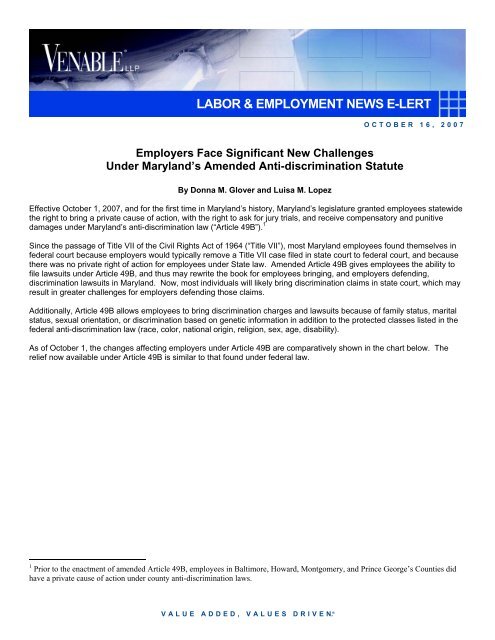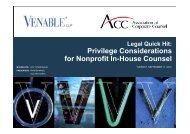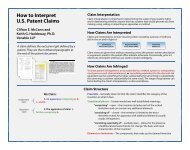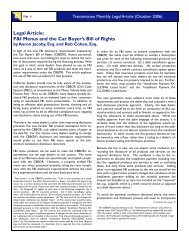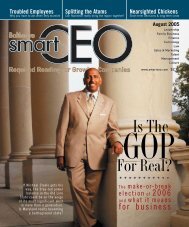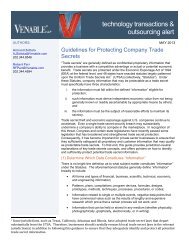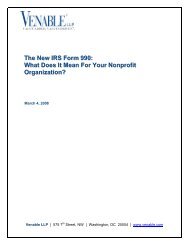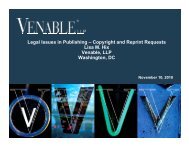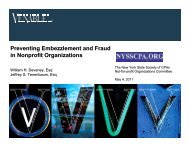Employers Face Significant New Challenges Under ... - Venable LLP
Employers Face Significant New Challenges Under ... - Venable LLP
Employers Face Significant New Challenges Under ... - Venable LLP
Create successful ePaper yourself
Turn your PDF publications into a flip-book with our unique Google optimized e-Paper software.
LABOR & EMPLOYMENT NEWS E-LERT<br />
OCTOBER 16, 2007<br />
<strong>Employers</strong> <strong>Face</strong> <strong>Significant</strong> <strong>New</strong> <strong>Challenges</strong><br />
<strong>Under</strong> Maryland’s Amended Anti-discrimination Statute<br />
By Donna M. Glover and Luisa M. Lopez<br />
Effective October 1, 2007, and for the first time in Maryland’s history, Maryland’s legislature granted employees statewide<br />
the right to bring a private cause of action, with the right to ask for jury trials, and receive compensatory and punitive<br />
damages under Maryland’s anti-discrimination law (“Article 49B”). 1<br />
Since the passage of Title VII of the Civil Rights Act of 1964 (“Title VII”), most Maryland employees found themselves in<br />
federal court because employers would typically remove a Title VII case filed in state court to federal court, and because<br />
there was no private right of action for employees under State law. Amended Article 49B gives employees the ability to<br />
file lawsuits under Article 49B, and thus may rewrite the book for employees bringing, and employers defending,<br />
discrimination lawsuits in Maryland. Now, most individuals will likely bring discrimination claims in state court, which may<br />
result in greater challenges for employers defending those claims.<br />
Additionally, Article 49B allows employees to bring discrimination charges and lawsuits because of family status, marital<br />
status, sexual orientation, or discrimination based on genetic information in addition to the protected classes listed in the<br />
federal anti-discrimination law (race, color, national origin, religion, sex, age, disability).<br />
As of October 1, the changes affecting employers under Article 49B are comparatively shown in the chart below. The<br />
relief now available under Article 49B is similar to that found under federal law.<br />
1 Prior to the enactment of amended Article 49B, employees in Baltimore, Howard, Montgomery, and Prince George’s Counties did<br />
have a private cause of action under county anti-discrimination laws.<br />
VALUE ADDED, VALUES DRIVEN. ®
LABOR & EMPLOYMENT NEWS ALERT OCTOBER 16, 2007 2<br />
Article 49B (prior to<br />
October 1, 2007)<br />
Amended Article 49B (effective<br />
October 1, 2007)<br />
State Court Action Not available Available for claims accruing on or<br />
after October 1, 2007. The Maryland<br />
Commission on Human Relations<br />
(MCHR) or the individual may sue in<br />
state court.<br />
Relief Available Back pay (limited to 3<br />
years )<br />
Back pay<br />
Reinstatement<br />
Reinstatement<br />
Private Right of Action and the MCHR’s <strong>New</strong> Authority<br />
As of October 1, employees have two options for bringing a discrimination claim. Individuals may take the administrative<br />
route, subjecting employers to a quicker, more flexible, and likely less advantageous hearing process. However,<br />
individuals taking the administrative route can still file suit against their employers. <strong>Employers</strong> may feel pressured by<br />
individuals to settle cases earlier in the process and for more money to avoid a court battle. After 180 days, regardless of<br />
the outcome of the administrative process, individuals may file suit in circuit court. The individual must file suit in the<br />
circuit court of the county where the alleged discriminatory act took place.<br />
The MCHR’s powers include suing on behalf of an individual via the administrative process or suing in circuit court. Both<br />
venues give the MCHR the power to seek expanded damages as described above, and the Office of Administrative<br />
Hearing’s Administrative Law Judges have the power to award those damages. Employees always have the right to opt<br />
out of the administrative process even after that process has begun. Unlike the federal law, employees do not need a<br />
“right-to-sue” letter or any other form of permission from the MCHR to bring suit in Maryland’s circuit courts.<br />
<strong>Employers</strong> May <strong>Face</strong> a Bumpy Road in State Court<br />
Compensatory damages, including<br />
emotional distress and front pay, from<br />
$50,000 to $300,000 depending on<br />
employer size;<br />
Punitive damages if the employer<br />
engaged in an unlawful employment<br />
practice with malice (subject to the<br />
statutory cap from $50,000 to<br />
$300,000 depending on employer<br />
size)<br />
Attorneys’ fees, expert witness fees,<br />
and costs<br />
Jury Trial Not Available Available where an individual seeks<br />
compensatory or punitive damages.<br />
Employees will likely file most discrimination suits in state court under amended Article 49B. Maryland’s circuit courts and<br />
its judges are likely less familiar than their federal counterparts with the expansive body of discrimination law that has<br />
developed in federal courts since the passage of Title VII. For Maryland employers, this means that the employer-friendly<br />
stance of the Court of Appeals for the Fourth Circuit may not be what state court judges rely on to develop Maryland’s<br />
body of anti-discrimination law. Plaintiffs’ attorneys will likely seek to bring the best cases forward to Maryland’s court<br />
system to test the legal waters and develop law favorable to their clients. Additionally, employers may find themselves<br />
facing juries in state court because state court judges, for the most part, have not presided over as many discrimination<br />
cases as their counterparts have.<br />
VALUE ADDED, VALUES DRIVEN. ®
LABOR & EMPLOYMENT NEWS ALERT OCTOBER 16, 2007 3<br />
<strong>Employers</strong> Should Review and Update Their Discrimination Policies<br />
Amended Article 49B is an historic change in Maryland discrimination law. <strong>Employers</strong> should take this opportunity to<br />
review and update their equal employment opportunity policies to ensure those policies include Maryland’s protected<br />
classifications, train supervisors regarding EEO laws, and educate management about Maryland’s amended Article 49B.<br />
* * *<br />
For more information about the matters discussed in this alert, please contact Donna Glover or Luisa Lopez. Donna Glover can<br />
be reached at 410.244.7694 or dmglover@venable.com. Luisa Lopez can be reached at 202.344.4506 or lmlopez@venable.com.<br />
In addition, you may also contact any member of <strong>Venable</strong>'s Labor and Employment Practice Group listed at<br />
http://www.venable.com/practice.cfmaction=attorneys&practice_id=303.<br />
© 2007 <strong>Venable</strong> <strong>LLP</strong> · www.<strong>Venable</strong>.com · 1.888.VENABLE<br />
This E-lert is published by the Labor and Employment Practice Group of the law firm <strong>Venable</strong> <strong>LLP</strong>. It is not intended to<br />
provide legal advice or opinion. Such advice may only be given when related to specific fact situations that <strong>Venable</strong> has<br />
accepted an engagement as counsel to address.<br />
VALUE ADDED, VALUES DRIVEN. ®


